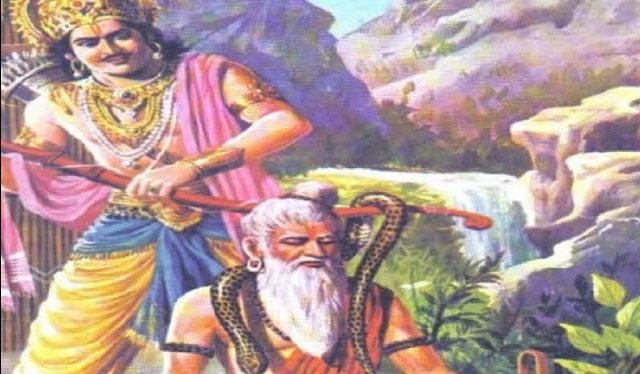In Chapter 18 of the Śrīmad-Bhāgavatam, titled “Mahārāja Parīkṣit Cursed by a Brāhmaṇa Boy,” we witness a series of dramatic events that set the stage for the recitation of the Bhāgavatam by Śukadeva Gosvāmī to King Parīkṣit. The chapter portrays a pivotal moment in history, where the king, who has upheld dharma all his life, becomes a target of an unjust curse. Despite the injustice, Parīkṣit embraces his fate with dignity and devotion. This chapter carries profound lessons about forgiveness, karma, and spiritual surrender.
Mahārāja Parīkṣit’s Tiredness and Thirst
The chapter begins with Mahārāja Parīkṣit feeling fatigued and thirsty after a hunting expedition in the forest. In search of water, he arrives at the āśrama (hermitage) of Śamīka Ṛṣi, a saintly sage absorbed in deep meditation. The king, who is usually composed, is overcome by physical discomfort and frustration when the sage does not respond to his request for water. This momentary lapse in Parīkṣit’s judgment leads to an impulsive act—he places a dead snake around the sage’s neck as a form of revenge.
This act is significant, as it highlights the human vulnerability of even the most exalted souls. The material body is subject to hunger, thirst, and fatigue, and these physical conditions can momentarily disturb even a pure devotee. However, Parīkṣit’s behavior is not to be viewed as an offense but rather as a divine arrangement by the Lord to initiate the narration of the Śrīmad-Bhāgavatam.
Lesson:
This episode teaches us that spiritual seekers must remain vigilant, as even a moment’s lapse can lead to unintended consequences. It also serves as a reminder of the temporary nature of the material body and the need for constant spiritual awareness, even in adverse circumstances.
The Curse of Śṛṅgi: A Moment of Anger
As news of the king’s action reaches Śṛṅgi, the young son of Śamīka Ṛṣi, he becomes furious. In a fit of anger and without full understanding of the situation, Śṛṅgi curses King Parīkṣit to die within seven days due to a snake-bird bite. The curse of Śṛṅgi is a critical turning point, as it brings out the theme of anger, an emotion that can cloud judgment and lead to harmful decisions.
Śṛṅgi’s anger, while directed against an unjust act, lacks the forgiveness and compassion that is expected of a brāhmaṇa. His impulsive curse reveals the need for emotional control, especially for those who hold spiritual responsibilities. The impetuosity of youth, combined with the power of a brāhmaṇa’s words, demonstrates the dangers of uncontrolled anger and abuse of spiritual power.
Lesson:
The incident serves as a powerful lesson on the importance of anger management and the restraint of power. It reminds us that even when we are justified in feeling anger, we must respond with forgiveness and discernment. In moments of provocation, taking a step back and seeking clarity can prevent rash decisions that may have severe repercussions.
Śamīka Ṛṣi’s Reaction: Compassion and Regret
When Śamīka Ṛṣi learns of his son’s curse, he is deeply disturbed, not because of the curse itself but because of the unjust treatment meted out to a saintly king like Parīkṣit. Śamīka Ṛṣi laments that his son has misused his brāhmaṇical power and that the king, a great protector of dharma, did not deserve such a punishment.
The sage’s reaction is a testament to the virtue of forgiveness and compassion. Rather than being angry at Parīkṣit for his behavior, Śamīka Ṛṣi is concerned about the unjust curse and the impact it will have on the world, as Parīkṣit’s rule had maintained peace and prosperity.
Lesson:
Śamīka Ṛṣi embodies the qualities of a true saint—compassion, forgiveness, and wisdom. His response teaches us that even when faced with injustice, we must maintain our equanimity and think of the greater good. True spiritual power lies not in cursing but in healing and guiding others back to the path of dharma.
Parīkṣit’s Acceptance of the Curse
When King Parīkṣit hears about the curse, he does not react with anger or a desire for revenge. Instead, he accepts the curse as the will of the Supreme Lord. He sees the curse as an opportunity to renounce the material world and focus entirely on spiritual realization.
Parīkṣit’s response is a hallmark of pure devotion, demonstrating complete surrender to the will of Krishna. Instead of resisting or lamenting his fate, Parīkṣit prepares himself for death by fasting on the banks of the Ganges and dedicating his remaining days to hearing about the pastimes of the Lord. This surrender is not born of helplessness but of spiritual maturity and a deep understanding of life’s transient nature.
Lesson:
Parīkṣit’s acceptance of the curse illustrates the quality of detachment and spiritual surrender. It teaches us that challenges and adversities, when approached with a devotional attitude, can become catalysts for spiritual growth. We must cultivate a mindset of surrender and acceptance, recognizing that everything happens according to Krishna’s divine plan.
The Role of Karma and Divine Arrangement
The incident of Parīkṣit’s curse raises the question of karma and divine arrangement. While the curse appears to be a result of Parīkṣit’s momentary lapse, it is ultimately part of the Lord’s plan to bring about the recitation of the Śrīmad-Bhāgavatam. This demonstrates that karma and divine will often work together in mysterious ways.
Parīkṣit’s impending death serves a higher purpose, as it becomes the context for the narration of the Bhāgavatam by Śukadeva Gosvāmī, which benefits not only the king but the entire world. This illustrates the concept of divine orchestration, where even seemingly tragic events are arranged by the Lord for the spiritual upliftment of humanity.
Lesson:
The interplay of karma and divine will teaches us that life’s events—even the painful ones—are ultimately meant for our spiritual benefit. We must cultivate faith in the Lord’s greater plan and trust that every circumstance is an opportunity for learning and growth.
Preparation for Death: Parīkṣit’s Spiritual Resolve
Parīkṣit’s acceptance of the curse marks the beginning of his spiritual preparation for death. He decides to renounce his kingdom, family, and worldly responsibilities, seeing them as temporary attachments. Parīkṣit’s detachment is not born out of despair but out of spiritual insight—he understands that the real purpose of life is to remember Krishna at the time of death.
By fasting by the Ganges and focusing on hearing the Śrīmad-Bhāgavatam, Parīkṣit sets an ideal example of how one should prepare for the inevitable reality of death. He does not seek to prolong his life but seeks to make it spiritually meaningful by immersing himself in transcendental sound vibration.
Lesson:
Parīkṣit’s resolve to prepare for death teaches us about the temporary nature of material life and the importance of spiritual focus. It reminds us that the ultimate goal of life is to develop Krishna consciousness, so that at the time of death, we can remember Him and achieve liberation.
The Importance of Hearing Śrīmad-Bhāgavatam
As Parīkṣit begins his preparations, the sages from all over the world gather at the banks of the Ganges to witness this extraordinary event. Their presence signifies the importance of hearing and discussing spiritual topics, especially the Śrīmad-Bhāgavatam, which is considered the ripened fruit of Vedic knowledge.
Hearing the Bhāgavatam is not merely an intellectual exercise but a transformative experience that purifies the heart and awakens love for Krishna. The presence of the sages emphasizes that the association of devotees is crucial for spiritual progress, as it provides inspiration, guidance, and support in the journey toward Krishna consciousness.
Lesson:
The assembly of sages around Parīkṣit teaches us about the power of satsanga (association with devotees). Regularly hearing and discussing the Bhāgavatam with like-minded souls can deepen our faith, knowledge, and devotion. It underscores the value of surrounding ourselves with spiritual company to keep our focus on Krishna.
A Call to Action: Embrace the Bhāgavatam Spirit
Chapter 18 of the Śrīmad-Bhāgavatam presents a profound message for every sincere spiritual seeker. It urges us to cultivate a spirit of forgiveness, surrender, and spiritual discipline, much like Mahārāja Parīkṣit. It reminds us that life’s trials and tribulations are opportunities for spiritual refinement, not merely obstacles.
The chapter calls us to embrace the teachings of the Bhāgavatam with full heart and mind, recognizing its power to transform our consciousness. Just as Parīkṣit found solace in hearing the Bhāgavatam at the time of death, we too can find spiritual strength, clarity, and direction by regularly immersing ourselves in its divine wisdom.
Lesson:
The chapter serves as a call to embrace the Bhāgavatam’s wisdom as our guiding light in life. Let us make the Bhāgavatam a central part of our spiritual practice, allowing its teachings to shape our thoughts, actions, and responses to life’s challenges. By doing so, we can awaken our dormant love for Krishna and prepare ourselves for the ultimate journey back to the spiritual realm.
Conclusion: Parīkṣit’s Path as Our Inspiration
The story of Mahārāja Parīkṣit’s curse is not one of defeat but of spiritual triumph. It teaches us that true greatness lies not in avoiding difficulties but in facing them with faith, surrender, and a spirit of devotion. As we navigate the complexities of life, let us draw inspiration from Parīkṣit’s courage and devotion, remembering that Krishna is always with us, guiding us toward spiritual victory.





